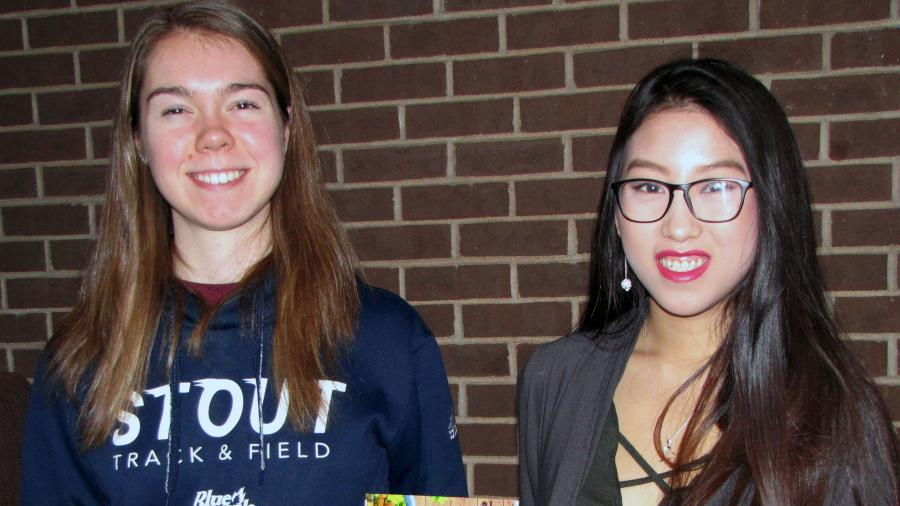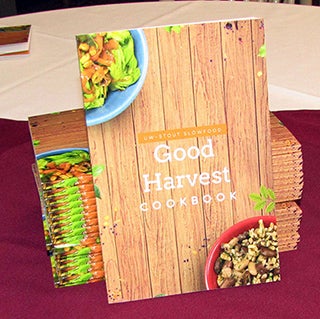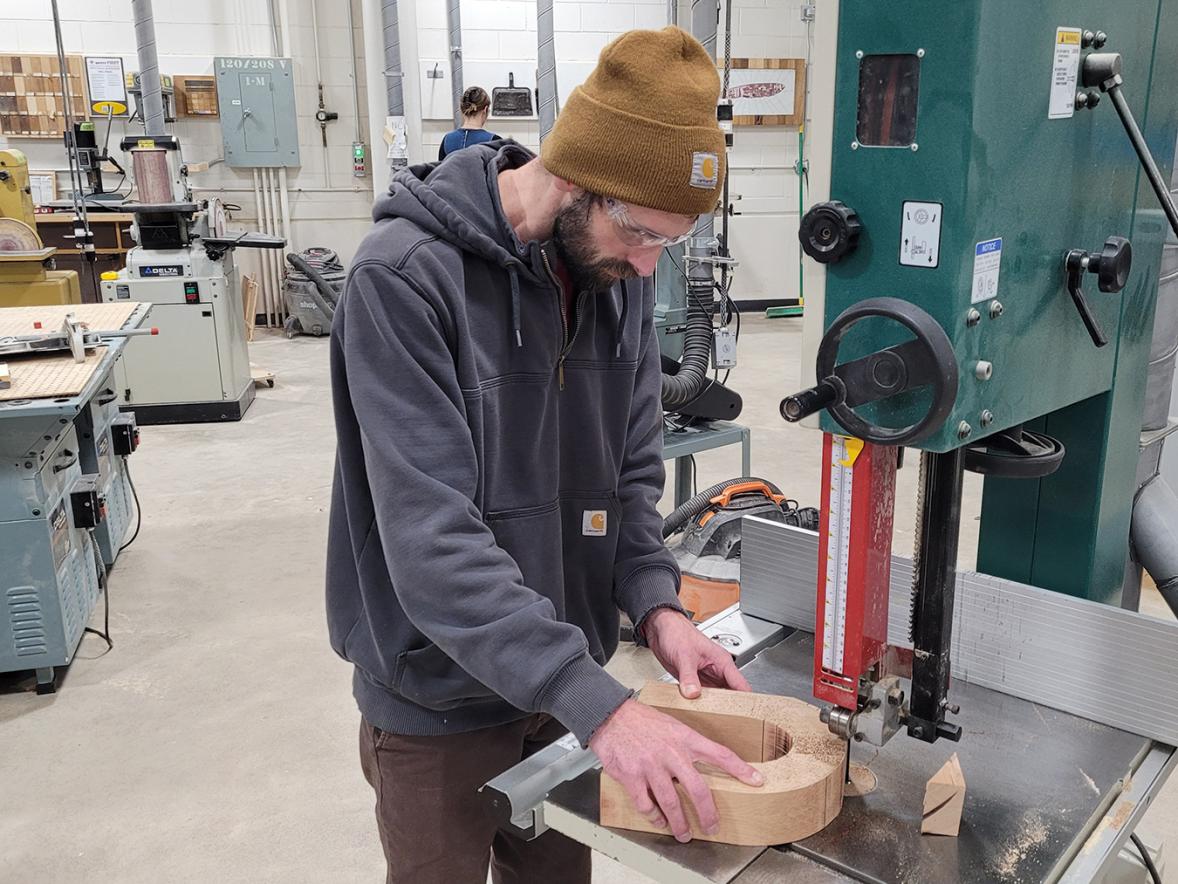
A University of Wisconsin-Stout club has published a cookbook promoting good, clean and fair food and the support of local farms and producers.
UW-Stout Slow Food’s “Good Harvest Cookbook” was a collaboration of students and the farmers. It is a full-color 82-page book featuring area farmers and producers.
Lauren Langworthy of Blue Ox, a 153-acre, grass-fed lamb and beef operation in Wheeler, is one of the featured farmers; she has a recipe for shepherd’s pie. Recently she attended a dinner on campus, which included food samples from the cookbook.
“I was really appreciative the students are interested in what we are doing out on our farm,” said Langworthy, who co-owns the farm with her husband, Caleb. “I also appreciate they are interested in the food they are eating and learning how to cook it. We want to feed people well. It’s fun to see our community supported by this community.”
Grass-fed animals tend to provide a healthier meat, higher in omegas, Langworthy said. Moving the lamb and cows to different pasture land helps prevent erosion, protects waterways and provides habitat for other animals.
 Matt Giguere, adviser of UW-Stout’s Slow Food USA chapter, wrote the preface for the cookbook.
Matt Giguere, adviser of UW-Stout’s Slow Food USA chapter, wrote the preface for the cookbook.
“When we started Slow Food UW-Stout a couple years ago, we began with a mission to advocate for the accessibility of good, clean and fair food for all on our campus and in our community,” wrote Giguere, School of Hospitality Leadership. “This cookbook is a reflection of our dedication to this mandate. Within these pages are the stories of our local farmers and the products they work so tirelessly to produce.
“In a time when our food system is persistently industrialized and globalized, it is imperative to remind ourselves of the arduous work our local farmers do to bring quality food to our tables,” he noted. “Together, our community can work to make quality food accessible to all by harvesting sustainable relationships with our farmers.”
Chia Lor, a junior graphic design and interactive media major from Hudson, worked on developing the layout and design of the cookbook. “It definitely opened my eyes to the Slow Food movement,” Lor said, noting one of her favorite parts was touring the local farms.
Her sister, Hleeda Lor, a senior graphic design major, took photographs and helped design the book. “I really enjoyed interviewing the farmers and listening to their stories,” Hleeda Lor said. “Their stories are so different. I really learned a lot about farming.”
Susan Wroblewski, a junior majoring in food science and technology from New Brighton, Minn., is a member of UW-Stout Slow Food and believes the cookbook will help promote healthy eating. “It’s about the local food we have around here that’s clean and healthier for you,” she said.
Nicole Dahle, vice president of UW-Stout Slow Food, a graduate student in food and nutritional sciences from Morristown, Minn., said her family roots are in farming. “Slow Food is all about cutting out the middle man and making sure farmers get fair pay,” Dahle said, noting she believes local food also tastes better.
Proceeds to benefit new Ark of Taste Garden
Proceeds from the cookbook will directly benefit the Ark of Taste Garden planned on campus near Heritage Hall. The raised bed garden will feature products native to the upper Midwest, which are protected by Slow Food’s Ark of Taste, a catalog of foods near extinction. Since 1996, more than 3,500 products from about 150 countries have been added to the International Ark of Taste, and more than 200 of these foods are from the United States.
The Ark of Taste is a tool for farmers, educators and consumers to seek out and celebrate diverse biological, cultural and culinary heritage, the book’s introduction noted. “The garden will also serve to educate UW-Stout hospitality and dietetics students, as well as young children within our community,” Giguere stated.
Aaron Kester, president of Slow Food UW-Stout, a graduate student in food and nutritional sciences, believes it’s important to raise awareness of plants that are becoming endangered. “A big thing Slow Food is about is empowering the local food culture and showing the importance of our local producers and farmers,” said Kester, of Grafton.
Lauren Mickley, a sophomore dietetics student from Johnstown, Ohio, interviewed farmers and was a project lead for the book. One of her first interviews was with Meg Wittenmeyer, owner of Bifrost Farm in rural Boyceville, who raises goats and has a dairy facility that churns out fresh cheeses like Chevre and Salzkase.
“It was just a neat place to learn about,” Mickley said. The book has Wittenmeyer’s goat cheese cheesecake recipe. “I want people to realize making delicacies isn’t hard or expensive,” Mickley said.
Choua Xiong, a junior majoring in dietetics, grew up in Milwaukee, where her parents had a vegetable farm. “I know how much work is needed for vegetable production,” said Xiong, who was a project lead for the book and interviewed farmers.
She learned even more how much work goes into creating organic fruits and vegetables by interviewing producers, she said.
Two more cookbooks planned
The book is divided into three sections:
- Good: Quality, flavorsome and healthy food
- Clean: Production that does not harm the environment
- Fair: Accessible prices for consumer and fair conditions and pay for producers.
Other farmers and producers featured in the book include, AVEnue Orchards in Eau Claire; Blaeser Farms, Chippewa Falls; Jeremiah’s Bullfrog Fish Farm, rural Menomonie; Mary Dirty Face Farm, rural Menomonie; Sonnenberg’s Rolling Acres, rural Colfax; Thornfield CSA, rural Menomonie; Valley Pasture Farm, rural Elk Mound; Wheatfield Hill Organics, Durand. Special mentions also include Ong Her, who has sold local flowers to farmer’s markets for 10 years and the Menomonie Farmer’s Market open summers.
The club is planning two additional cookbooks, “Clean Harvest” and “Fair Harvest.”
Slow Food International is a global, grassroots organization founded in 1989 to prevent the disappearance of local food culture and traditions, counteract the rise of fast-paced living and combat people’s dwindling interest in the food they eat, where it comes from and how food choices affect the world. Chapters are in 160 countries.
Slow Food UW-Stout was founded in 2016.
To order the “Good Harvest Cookbook,” contact slowfood@uwstout.edu or find UW-Stout Slow Food on Facebook.
###
Photos
The UW-Stout Slow Food “Good Harvest Cookbook” recently was published.
UW-Stout students gathered to sample some of the recipes in the Slow Food “Good Harvest Cookbook.”







